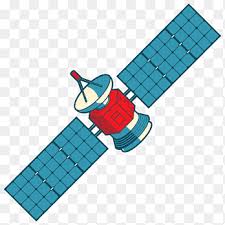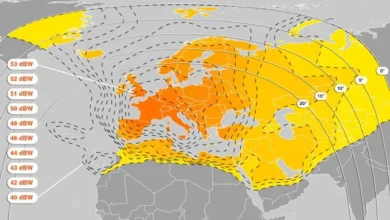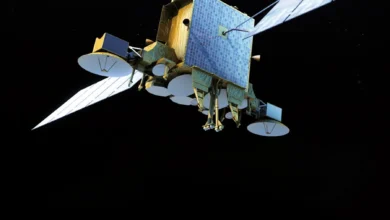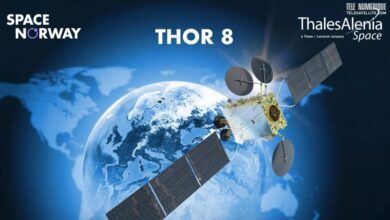Thor Satellite System: A Pinnacle of Connectivity and Broadcasting 2025 🌌

The Thor satellite system, masterfully orchestrated by Space Norway, stands as a beacon of innovation in global satellite communications, illuminating Europe, the Middle East, North Africa (MENA), and beyond with unparalleled broadcasting and connectivity.
Anchored at the prime orbital slot of 0.8° to 1° West, the Thor fleet—comprising Thor 5, Thor 6, Thor 7, Intelsat 10-02, and the forthcoming Thor 8—delivers over 1,000 television and radio channels 📡 to 18 million households.
From vibrant DTH broadcasts to high-speed maritime broadband, Thor is a trailblazer in connecting people, cultures, and industries.
This article dives into the Thor system’s cutting-edge technology, its transformative impact, key frequency details for tuning, and expert tips for seamless reception as of July 2025.
Why Thor Shines Bright 🌟
-
Global Reach 🌍: Blankets the Nordics, Central and Eastern Europe, the Middle East, and maritime hubs like the North Sea, Baltic Sea, and Mediterranean with Ku- and Ka-band beams.
-
Broadcasting Brilliance 📺: Streams crystal-clear HD and SD channels, featuring global giants like BBC, Disney, and Eurosport, captivating audiences with stunning visuals.
-
Maritime Mastery ⚓: Powers high-speed broadband for ships and offshore platforms, boosting crew welfare and operational excellence with 2–6 Mbps uplink speeds.
-
Technological Vanguard 🚀: Harnesses advanced payloads, including Thor 7’s Ka-band high-throughput satellite (HTS) and Thor 8’s dual-purpose design for commercial and government use.
-
Versatile Access 🔓: Offers a blend of free-to-air and encrypted channels, ensuring inclusivity for diverse viewers and broadcasters.
The Thor Fleet: A Constellation of Excellence 🛰️
Space Norway’s Thor satellites are a testament to engineering prowess, evolving to meet the demands of modern connectivity. Here’s a closer look at the fleet as of July 2025:
-
Thor 5 🌠: Launched in February 2008 aboard a Proton-M rocket by Orbital Sciences Corporation, Thor 5 operates on the STAR-2 platform with 24 Ku-band transponders (3.6 kW power). Positioned at 1° West, it powers DTH television and telecommunications across the Nordics, Europe, and the Middle East, remaining a steadfast pillar of the fleet.
-
Thor 6 (Intelsat 1W) 📡: Launched in October 2009 via an Ariane 5 rocket by Thales Alenia Space, Thor 6 leverages the Spacebus-4000B2 platform with 36 Ku-band transponders (16 for Nordics, 20 for Central/Eastern Europe). Stationed at 0.8° West, it succeeded Thor 3, supporting DTH and broadband services, with Intelsat leasing 10 transponders.
-
Thor 7 🌊: Launched in April 2015 by Space Systems/Loral (SSL) on an Ariane 5 rocket, Thor 7 is a multi-mission marvel with 11 Ku-band transponders for broadcasting and 25 Ka-band spot beams for maritime broadband. Covering the North Sea, Red Sea, Baltic Sea, Persian Gulf, and Mediterranean, it delivers 2–6 Mbps uplinks and is positioned at 1° West, with a lifespan beyond 2030.
-
Thor 10-02 (Intelsat 10-02) 🔧: Launched in June 2004 by Thales Alenia Space, this satellite, co-operated with Intelsat, received a groundbreaking mission extension in 2021 via Northrop Grumman’s Mission Extension Vehicle-2 (MEV-2). At 1° West, it supports broadcasting and connectivity across Europe and the Middle East.
-
Thor 8 (Future) 🔮: Commissioned in 2025 from Thales Alenia Space, Thor 8 is a dual-use satellite with Ku- and Ka-band payloads, set for launch around 2028.
-
It will elevate broadcasting in the Nordics and Central/Eastern Europe while enhancing maritime and government connectivity across EMEA, with a 15-year lifespan.
Frequency Guide for Thor Satellites 📡
Thor satellites power Nordic and European broadcasters, delivering channels like Cartoon Network, BBC Earth, and TV2 Hungary.
Frequency for Thor Satellites 📊
|
Satellite |
Frequency |
Polarization |
Symbol Rate |
FEC |
Coverage |
Details |
|---|---|---|---|---|---|---|
|
Thor 5 |
11265 MHz |
Horizontal (H) |
25000 kS/s |
3/4 |
Nordics, Europe, Middle East |
DVB-S2, 8PSK, Canal Digital Beam T1, HDTV/SD, scrambled/free-to-air. 📺 |
|
Thor 6 |
10809 MHz |
Vertical (V) |
25000 kS/s |
3/4 |
Nordics, Central/Eastern Europe |
DVB-S2, 8PSK, HDTV/SD, scrambled/free-to-air, K1/K2 beams. 📡 |
|
Thor 7 |
12245 MHz |
Horizontal (H) |
30000 kS/s |
5/6 |
Europe, Middle East |
DVB-S2, Ku-band, HDTV/SD, scrambled/free-to-air, broadcasting beam. 📻 |
|
Thor 10-02 |
11305 MHz |
Vertical (V) |
27500 kS/s |
3/4 |
Europe, Middle East |
DVB-S2, HDTV/SD, scrambled/free-to-air, Intelsat beam. 📽️ |
Key Information 🔍
-
Coverage Reach 🌍: Thor 5, 6, and 10-02 deliver Ku-band broadcasting to the Nordics, Central/Eastern Europe, and parts of the Middle East. Thor 7’s Ka-band supports maritime broadband in the North Sea, Red Sea, Baltic Sea, Persian Gulf, and Mediterranean.
-
Frequency Precision ✅: Use the listed transponders for current channel lineups. Avoid outdated frequencies like 11785 MHz (Vertical, FEC 7/8) on Thor 5 or 11389 MHz (Horizontal) on Thor 6, which may no longer be active.
-
Emirates TV Note 🚫: As of July 2025, Emirates TV is not broadcast on Thor. For Emirates TV, tune to Nilesat (12226 MHz, Vertical, 27500 kS/s, FEC 5/6, HD, DVB-S2), Arabsat (11804 MHz, Horizontal, 27500 kS/s, FEC 3/4, SD, DVB-S), or Hot Bird (11747 MHz, Vertical, 27500 kS/s, FEC 3/4, SD, DVB-S).
-
Access Options 🔓: Thor offers free-to-air and scrambled channels (e.g., Canal Digital, Allente). Scrambled channels may require a compatible receiver with decryption (e.g., Conax).
Mastering Reception: Tips for Optimal Performance 📡
To capture Thor’s signals (0.8° W or 1° W) with flawless clarity, follow these expert tips for superior reception:
-
Dish Size 📏: Opt for a 70-100 cm dish in the Nordics and Central Europe. For the Middle East or fringe areas (e.g., southern Europe, North Africa), a 100-150 cm dish ensures robust signal strength.
-
Precision Alignment 🧭: Align your dish to 0.8° West or 1° West using a satellite finder or mobile apps. Clear obstructions like buildings or trees for an unobstructed line of sight.
-
LNB Compatibility 🔌: Use a Universal Ku-band LNB (9.75/10.6 GHz) for Thor 5, 6, and 10-02 Ku-band transponders, or a Ka-band LNB for Thor 7’s maritime services. Verify receiver support for DVB-S and DVB-S2.
-
Signal Strength 📶: Aim for 70% or higher signal quality (98% optimal) on your receiver’s meter to eliminate pixelation. Fine-tune LNB skew for maximum performance.
-
Weather Resilience ☔: Protect against signal loss in heavy rain or snow by securing your dish and ensuring LNB caps are watertight.
-
Coverage Verification 🗺️: Confirm your location falls within Thor’s beam (Nordics, Europe, MENA, or maritime zones) for reliable reception.
Tuning Thor Satellites: A Step-by-Step Guide 📺
Adding Thor’s channels to your satellite receiver is seamless with these steps, compatible with most receivers (e.g., Strong, Humax, Starsat), though menu labels may vary.
-
Access the Menu ⚙️: Press “Menu” or “Settings” on your remote, then navigate to “Installation,” “Channel Search,” or “Antenna Setup.”
-
Select Manual Scan 🔎: Choose “Manual Scan,” “Manual Installation,” or “Add Transponder,” then select “Add TP” or “Edit Transponder.”
-
Choose Your Satellite 🛰️: Select Thor 5, Thor 6, Thor 7, or Intelsat 10-02 (Thor 10-02) at 0.8° West or 1° West. If unavailable, manually enter the orbital position (0.8° W or 1° W).
-
Input Transponder Settings 📋: Enter settings from the frequency table (e.g., 11265 MHz, Horizontal, 25000 kS/s, 3/4 for Thor 5). Verify accuracy.
-
Run the Scan 🔄: Press “Scan,” “Search,” or “OK.” Select “FTA Only” for free-to-air channels or “All Channels” for all options. Wait 1-3 minutes for completion.
-
Save Channels 💾: Press “Save” or “OK” to store channels like “TV2 HD” or “BBC Earth” in your list.
-
Fine-Tune Signal 🔧: Adjust dish azimuth and elevation if the signal is weak, targeting 70-98% strength. Check LNB skew and cables.
-
Test Playback 📺: Select a channel to confirm clear playback. Consult a professional installer if issues persist.
Receiver Tips 🔌:
-
Enable “LNB Power” on Strong receivers (e.g., SRT 4950) in the “Transponder” menu.
-
Set LNB to “Universal” for Ku-band or specify Ka-band for Thor 7 on Humax or Starsat.
-
Use default PINs (e.g., 0000, 1234) if prompted; check your manual.
Thor’s Global Impact and Future Horizon 🌟
The Thor satellite system redefines connectivity and broadcasting:
-
Broadcasting Powerhouse 📡: Streams over 1,000 digital TV and radio channels via platforms like Allente, serving broadcasters like Viacom, Disney, and TV2 Hungary.
-
Maritime Innovation ⚓: Thor 7’s Ka-band delivers 2–6 Mbps broadband to ships and offshore platforms, enhancing crew welfare and operational efficiency.
-
Sustainability Pioneer ♻️: Thor 10-02’s 2021 mission extension via MEV-2 set a global benchmark for satellite servicing, extending life and reducing debris.
-
Thor 8’s Vision 🔮: Launching in 2028, Thor 8 will bolster Ku- and Ka-band services, supporting broadcasting, maritime, and government needs with a 15-year lifespan.
-
Integrated Ecosystem 🌐: Combines satellite, fiber, and terrestrial networks, supporting initiatives like Project Greensand for carbon storage in the North Sea.




